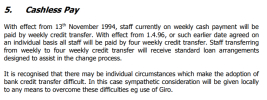Many of you have told me you once worked for BR, this would for many have meant working shifts.
So what shifts would have have typically worked over say in a month?
If you worked nights for example, would you work a full week of them?
Were the shifts rotated through the week?
Overtime - was that expected or did you apply for it?
Short resting - could someone please explain what that was and how it worked?
Did you get a couple of days off together or were they split?
And what about the clerical staff. did they clock off Saturday lunchtime?
On a basic week (excluding overtime) how many days did you work together?
One person I knew many years ago (who was a guard) was seriously unimpressed that he had to work on a late passenger train, once at its destination he had to wait until 2am for a lift back on a freight train. His gripe was he was on an early that morning.
I'm curious about the shift patterns, how they were planned, implemented, and frankly how you coped with them?
Thanks.
So what shifts would have have typically worked over say in a month?
If you worked nights for example, would you work a full week of them?
Were the shifts rotated through the week?
Overtime - was that expected or did you apply for it?
Short resting - could someone please explain what that was and how it worked?
Did you get a couple of days off together or were they split?
And what about the clerical staff. did they clock off Saturday lunchtime?
On a basic week (excluding overtime) how many days did you work together?
One person I knew many years ago (who was a guard) was seriously unimpressed that he had to work on a late passenger train, once at its destination he had to wait until 2am for a lift back on a freight train. His gripe was he was on an early that morning.
I'm curious about the shift patterns, how they were planned, implemented, and frankly how you coped with them?
Thanks.


